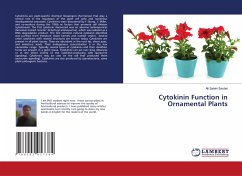Cytokinins are plant-specific chemical messengers (hormones) that play a central role in the regulation of the plant cell cycle and numerous developmental processes. Cytokinins were discovered by F Skoog, C Miller, and co-workers during the 1950s as factors that promote cell division (cytokinesis). The first cytokinin discovered was an adenine (aminopurine) derivative named 'kinetin' (6-furfuryl aminopurine), which was isolated as a DNA degradation product. The first common natural cytokinin identified was purified from immature maize kernels and named 'zeatin'. Several other cytokinins with related structures are known today. Cytokinins are present in all plant tissues. They are abundant in the root tip, shoot apex, and immature seeds. Their endogenous concentration is in the low nanomolar range. Typically, several types of cytokinins and their modified forms are present in a given tissue. Cytokinins can act over long distances or in the direct vicinity of the cytokinin-producing cells (paracrine signaling). Cytokinins may act also on the cell that produced them (autocrine signaling). Cytokinins are also produced by cyanobacteria, some plant pathogenic bacteria.
Hinweis: Dieser Artikel kann nur an eine deutsche Lieferadresse ausgeliefert werden.
Hinweis: Dieser Artikel kann nur an eine deutsche Lieferadresse ausgeliefert werden.








